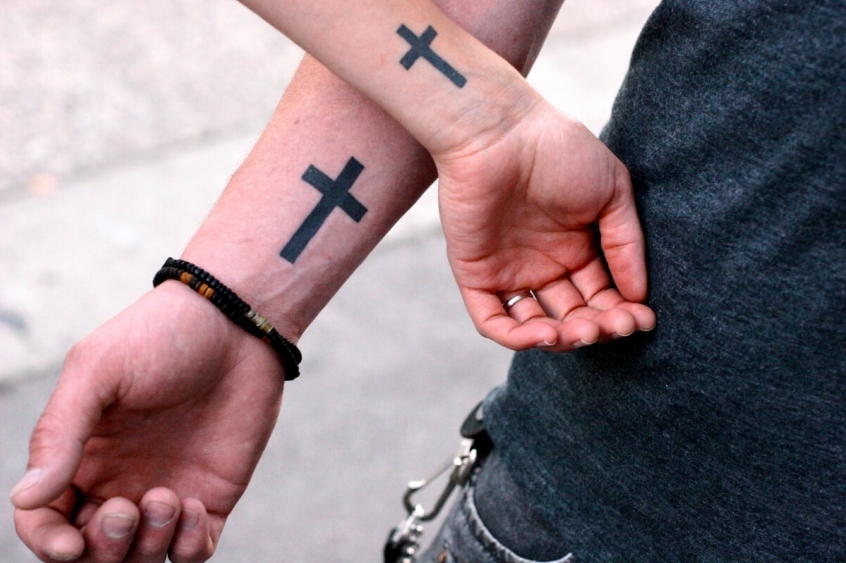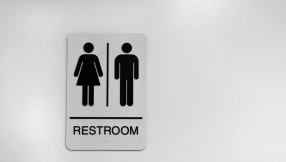
Should Christians get tattoos?
In a world that sometimes seems to be falling to pieces around our ears, it's probably fair to say that's not the most burning question of the day. At the same time, it's definitely a thing. We want to know how to live in the world in a way that's distinctively Christian. In the UK, around a fifth of British adults have at least one tattoo. In the US it's nearly a quarter. The chances are that many Christians are among them. So why does it make some people so uncomfortable?
For some Christians, the "clobber text" that rules tattoos out completely is found in Leviticus 19:28, which says: "Do not cut your bodies for the dead or put tattoo marks on yourselves. I am the Lord."
However, scholars believe this is a way of distinguishing the Israelite people from the tribes and religions around them. Egyptian women would have their breasts and thighs tattooed with the image of the fertility goddess, Bes, while Canaanites would slash their bodies for ritualistic purposes (Elijah's encounter with the prophets of Baal in 1 Kings 18:28 is an example). It appears that it was also a mourning ritual, perhaps aimed at honouring the gods and ensuring a peaceful transition to the afterlife for the person who had died.
On this way of reading it, the prohibition against tattooing is linked to the prohibition of self-mutilation for religious reasons. Some scholars even argue that they were the same thing: the word for "tattoo" means "print marks", which might refer to the scars left by cutting or scratching and have nothing to do with inking designs on the flesh at all.
Either way, it seems very unlikely that the prohibition in Leviticus has anything to do with modern tattooing. It's a command addressed specifically to the Israelite people in the religious and cultural context of their day. Many of the laws in Leviticus are aimed at establishing their separateness from the people around them: they are a people holy to the Lord. Today, most Christians would accept that tattoos are just art, with no religious overtones. Some still insist they are the Mark of the Beast in Revelation, though serious scholars do not accept this.

So what can we usefully say to people in our congregations who might be thinking about getting a tattoo? On a practical level, we might offer some common-sense advice. Think before you ink – don't get a tattoo on a theme or in a place where you're likely to regret it. Count the cost, as well: some tattoos by expert practitioners can cost hundreds or thousands of pounds. And it's not just the money, either: be prepared for the social cost of potentially losing out on jobs and having people misjudge you based on what you look like.
But there's another way of looking at tattoos altogether.
Why not, instead of at best tolerating them, acknowledge their status as art and celebrate them?
Full disclosure: I've never had one, never wanted one. As a middle-aged man, I associate it with the same mid-life crisis that leads my contemporaries to get their ears pierced and trade in the family Volvo to buy a motorbike. (I find it a bit galling that one of my friends who's done all three has never been happier – doesn't he know how ridiculous he's supposed to be?)
Of course there are some terrible examples of tattooing out there. Some of it's just badly done, some of it's tasteless or obscene and some of it's boring. All art is like that: for every Paul Klee or Henri Matisse there are hundreds of people doodling on their lecture notes or writing on lavatory walls.
But some of it's wonderful. It's skilful, original and creative. Having a design on their bodies lets people say something about how they feel, who they are and who they want to be.
There's a risk that will change over time. But even if it does, it's not necessarily a cause for regret. The tattoo is a permanent record of what we used to be, and so it's still a marker of where we are.
For Christians, tattoo art could serve another function, too – not just as art for art's sake, but as art with a spiritual purpose. A design with Christian overtones can not only be a talking point with others but a permanent reminder to ourselves of something precious. One friend of mine, for instance, has large tattoos reading 'grace' and 'truth' on his inner forearms in Greek – exquisitely painful, but deeply meaningful.
And here's another thing. In the book of Isaiah, the prophet speaks of God's eternal care for Jerusalem, using the startling image of – a tattoo. "I have written you on the palms of my hands," God says (49:16); "your walls are ever before me."
I'm still not tempted, frankly; apart from anything else, I have a deep aversion to pain. But if you want one, I'm genuinely happy for you.
Follow Mark Woods on Twitter: @RevMarkWoods

















